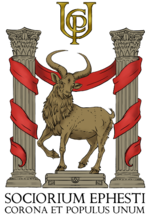Ephestus
| Sociorium of Ephestus Sociorium Ephesti | |
| Flag | Coat of arms |
|---|---|

|

|
| Motto: tbc | |
| Anthem: tbc | |
| Locator map | |
| File:Ephestus Map.png | |
| Capital city | Castravarium |
| Largest city | Castravarium |
| Official language | Auresian |
| Other languages | TBC |
| Ethnic group | Imbatu - Karsk |
| Religion | Mbanan - Auserian |
| Demonym(s) | Ephestian |
| Government | |
| Government Type | Unitary monarcho-socialist state |
| First Citizen | tbc |
| Premier | tbc |
| Legislature | Council of Citizens’ Representatives |
| Establishment | |
| tbc | tbc |
| Area | |
| Total | tbc km2 |
| Water % | tbc |
| Population | |
| Total | tbc |
| Density | tbc/km2 |
| Economy | |
| Economy type | Consumer socialist |
| GDP (total) | Ꞡ tbc |
| GDP per capita | Ꞡ tbc |
| Currency | tbc.png (tbc) |
| Inequality index | tbc |
| Development index | tbc |
| Other information | |
| Time zone | tbc |
| Driving side | tbc |
| Calling code | tbc |
| Internet code | tbc |
| Nation number | 00 |
Ephestus ( Auresian: Efesto), officially the State of Ephestus (Arvorian: Stato di Efesto), is a country in southeastern Tzeraka.
Etymology
History
Early history
Colonial period
Post-colonial period
Geography
Government and politics
Executive
The First Citizen (Primo Cittadino), also known as the "People's Monarch", is the nation's hereditary head of state. They have extensive ceremonial duties, and some specific political powers bound by constitutional law. They lead the cause of the people of the nation, acting as the principal voice of the citizenry and the "spirit of the nation's legacy" whose functions legitimise the government.
The Premier (Premiere) is the nation's head of government. They are appointed by the First Citizen following each general election, with their term running concurrently with that of the Council. They direct state policy, meet weekly with the First Citizen to report on current matters, and provide regular updates to the legislature on current events and state business.
The Cabinet of Ministers (Gabinetto dei Ministri) are that group of ministers responsible for oversight and management of specific government departments, working with the premier in setting and planning the policy and priorities of the nation. There are, at present, TBD ministries: foreign affairs, defence, internal security, justice, finance, health, education, transport and communications, labour and employment, social affairs, agriculture and forestry, and culture.
Legislative
The Council of Citizens’ Representatives is the unicameral national legislature that creates and passes laws. Members are elected by the populace in accordance with specific standards, reflecting the importance of community representation. Specialised committees focus on various aspects of governance, such as economics, social welfare, and public services.
Judicial
The judicial system is an independent arm that exists to protect citizens’ rights, ensure the law is observed, and that those requiring punishment or rehabilitation receive what they need or deserve accordingly. The highest court in the nation is the Constitutional Court, which oversees the adherence to the laws of the constitution, particularly regarding government activity, human rights, and social welfare. Its members, seven assessors, are appointed by the First Citizen upon the approval of the Council following their nomination by the Premier.